10 Natural Treatments for Cold Sores
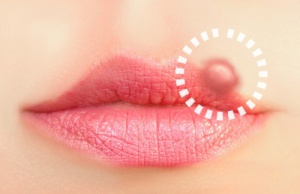
Oral herpes, also known as cold sores or fever blisters, is caused by a virus that is generally passed from one person to another by kissing or close contact with someone who has an active breakout. It can also occur by using contaminated objects such as shaving razors, lipsticks and towels, among others. In today’s article we’ll look at 10 natural treatments for cold sores to help you fight these annoying invasions!
Cold sores appear as red blisters or breakouts on the lips. Before these blisters become visible, the person may feel an itching or burning sensation. These are signs that a breakout is on its way.
According to specialized studies, by the time we reach adulthood, almost everyone has had a cold sore at some point in their life. And since this condition is so common, there are lots of different treatments that could help you treat or even cure it.
Natural treatments for cold sores
We usually realize we have oral herpes when we wake up and see we have a cold sore. When this happens, there are a number of things you can do to help alleviate this.
Before implementing any kind of natural treatment, we recommend cleaning the affected area with antibacterial soap and water. This will keep the virus from spreading any further.
Garlic treatment
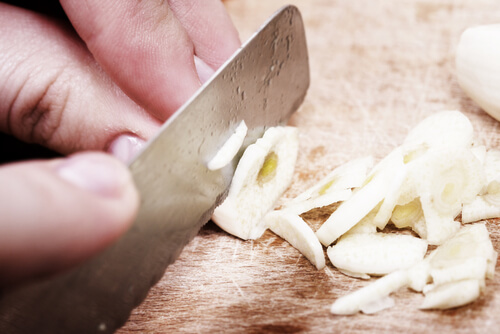
Milk treatment
Milk is rich in lysine, a component which helps to inhibit arginine, the amino acid responsible for causing oral herpes breakouts. Therefore, you can speed up the healing process with this milk treatment. Just dip a cotton ball in a bit of milk and rub it on the cold sore.
Ice treatment
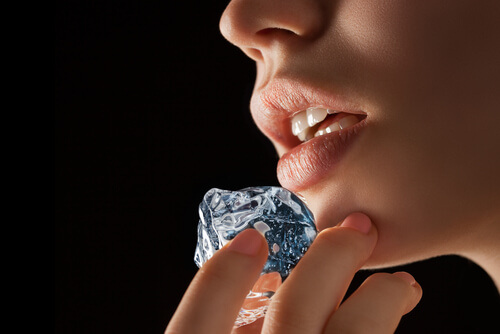
As soon as you start to feel any itching or swelling around your lips, we recommend applying a bag of ice wrapped in a towel to the area for a few minutes.
Black tea treatment
To alleviate the pain associated with cold sores and speed up the healing process, you can apply a black tea compress to the affected area.
Tomato and aloe vera treatment
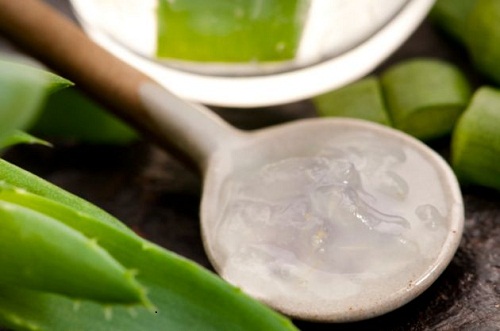
Another of our natural treatments for cold sores involves tomato and aloe vera. Firstly, clean the affected area daily and then apply a bit of tomato pulp. Allow it to set for a minute and then apply some aloe vera. This will help the blister to dry out.
Read more: 5 Big Benefits that Aloe Vera Gel Boasts for Your Skin
Lemon juice treatment
Lemons are natural disinfectants and antiseptics, meaning they are great for fighting off viruses like oral herpes, which causes cold sores. For this treatment, just apply 4 drops of lemon juice to the blister 3 times per day.
Yogurt treatment
Yogurt contains a substance that naturally eliminates the herpes virus and cleans the affected area. We recommend eating yogurt during the entire time that you are suffering from this condition, as well as applying it directly to the blister. If you choose to apply it directly, the yogurt should be nice and cold.
Green tomato treatment
First mix green tomato pulp with a tablespoon of baking soda. Then apply this mixture to the affected area with a cotton ball.
Honey treatment
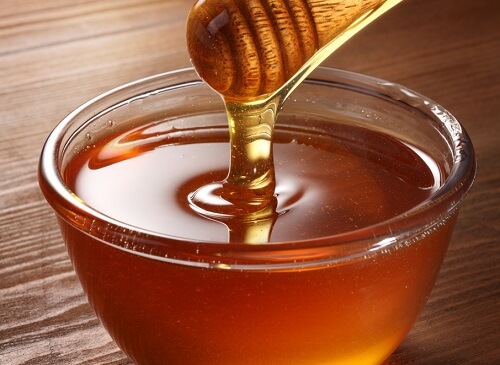
Mix one teaspoon of pure honey with a bit of vinegar. Apply the mixture to the affected area 3 or 4 times per day.
Salt treatment
The last of our natural treatments for cold sores involves salt. Use a spoon to crush salt until it becomes very fine. After that, apply it to the affected area with a cotton wool ball. Repeat this process 2 to 3 times per day.
Recommendations for even better results
In addition to our natural treatments for cold sores, you should keep in mind that there are certain hygiene habits you should be aware of. These can help you get rid of the virus altogether and thus avoid having to deal with this condition in the future.
- If you want cold sores to dry out quickly, you should clean them every day.
- Avoid exposing them to direct sunlight.
- Don’t pop the blister or remove the dead skin once it has dried out. This will go away on its own once the virus is gone.
- Once you have finished your treatment, throw away any products or elements that were in contact with the wound. These can include toothbrushes, razors and makeup products, among others.
- Stop consuming all foods with arginine. This amino acid is crucial to the herpes virus’s metabolism and will allow the virus to live longer in your body. Some foods with very high levels of arginine include chocolate, cola drinks, peas, peanuts, gelatin, walnuts and beer.
All cited sources were thoroughly reviewed by our team to ensure their quality, reliability, currency, and validity. The bibliography of this article was considered reliable and of academic or scientific accuracy.
- Allarakha, S., MD, & Mbbs, K. K. (2022, 11 marzo). Do cold sores mean you have an STD? How to kill cold sores naturally. MedicineNet. https://www.medicinenet.com/do_cold_sores_mean_you_have_an_std/article.htm
- Astani, A., Reichling, J., & Schnitzler, P. (2010). Comparative study on the antiviral activity of selected monoterpenes derived from essential oils. Phytotherapy research : PTR, 24(5), 673–679. https://pubmed.ncbi.nlm.nih.gov/19653195/
- Camero, M., Lanave, G., Catella, C., Capozza, P., Gentile, A., Fracchiolla, G., Britti, D., Martella, V., Buonavoglia, C., & Tempesta, M. (2019). Virucidal activity of ginger essential oil against caprine alphaherpesvirus-1. Veterinary microbiology, 230, 150–155. https://pubmed.ncbi.nlm.nih.gov/30827382/
- Cantatore, A., Randall, S. D., Traum, D., & Adams, S. D. (2013). Effect of black tea extract on herpes simplex virus-1 infection of cultured cells. BMC complementary and alternative medicine, 13, 139. https://www.ncbi.nlm.nih.gov/pmc/articles/PMC3698045/
- Cold sores: Tips for managing. (s/f). American Academy of Dermatology. Recuperado el 5 de septiembre de 2023, de https://www.aad.org/public/diseases/a-z/cold-sores-self-care
- Del Fresno, V., & María, Á. (2001). Hammamelis virginiana. Fitoquímica, farmacología y terapéutica. Farmacia profesional (Internet), 15(6), 86–91. https://www.elsevier.es/es-revista-farmacia-profesional-3-articulo-hammamelis-virginiana-fitoquimica-farmacologia-terapeutica-13015466
- De Oliveira, A., Prince, D., Lo, C. Y., Lee, L. H., & Chu, T. C. (2015). Antiviral activity of theaflavin digallate against herpes simplex virus type 1. Antiviral research, 118, 56–67. https://pubmed.ncbi.nlm.nih.gov/25818500/
- Herpes labial – síntomas y causas – Mayo Clinic. (2023, 2 agosto). https://www.mayoclinic.org/es/diseases-conditions/cold-sore/symptoms-causes/syc-20371017
- Koch, C., Reichling, J., Kehm, R., Sharaf, M. M., Zentgraf, H., Schneele, J., & Schnitzler, P. (2008). Efficacy of anise oil, dwarf-pine oil and chamomile oil against thymidine-kinase-positive and thymidine-kinase-negative herpesviruses. The Journal of pharmacy and pharmacology, 60(11), 1545–1550. https://pubmed.ncbi.nlm.nih.gov/18957177/
- Lemon balm. (s/f). Mount Sinai Health System. Recuperado el 6 de septiembre de 2023, de https://www.mountsinai.org/health-library/herb/lemon-balm
- Naik, P. P., Mossialos, D., Wijk, B. V., Novakova, P., Wagener, F. A. D. T. G., & Cremers, N. A. J. (2021). Medical-Grade Honey Outperforms Conventional Treatments for Healing Cold Sores-A Clinical Study. Pharmaceuticals (Basel, Switzerland), 14(12), 1264. https://www.ncbi.nlm.nih.gov/pmc/articles/PMC8706154/
- Propolis. (s/f). Medlineplus.gov. Recuperado el 6 de septiembre de 2023, de https://medlineplus.gov/druginfo/natural/390.html
- Remedios caseros para el herpes labial. (2022). Plannedparenthood.org. Recuperado el 6 de septiembre de 2023, de https://www.plannedparenthood.org/es/blog/remedios-caseros-para-el-herpes-labial
- Rezazadeh, F., Moshaverinia, M., Motamedifar, M., & Alyaseri, M. (2016). Assessment of Anti HSV-1 Activity of Aloe Vera Gel Extract: an In Vitro Study. Journal of dentistry (Shiraz, Iran), 17(1), 49–54. https://www.ncbi.nlm.nih.gov/pmc/articles/PMC4771053/
- Rouf, R., Uddin, S. J., Sarker, D. K., Islam, M. T., Ali, E. S., Shilpi, J. A., Nahar, L., Tiralongo, E., & Sarker, S. D. (2020). Antiviral potential of garlic (Allium sativum) and its organosulfur compounds: A systematic update of pre-clinical and clinical data. Trends in food science & technology, 104, 219–234. https://www.ncbi.nlm.nih.gov/pmc/articles/PMC7434784/
- Vilhelmova-Ilieva, N., Atanasov, G., Simeonova, L., Dobreva, L., Mancheva, K., Trepechova, M., & Danova, S. (2022). Anti-herpes virus activity of lactobacillus’ postbiotics. BioMedicine, 12(1), 21–29. https://www.ncbi.nlm.nih.gov/pmc/articles/PMC9236710/
- Watson, K. (2020, octubre 28). Essential oils for cold sores. Healthline. https://www.healthline.com/health/essential-oils-for-cold-sores
- Wińska, K., Mączka, W., Łyczko, J., Grabarczyk, M., Czubaszek, A., & Szumny, A. (2019). Essential Oils as Antimicrobial Agents-Myth or Real Alternative?. Molecules (Basel, Switzerland), 24(11), 2130. https://www.ncbi.nlm.nih.gov/pmc/articles/PMC6612361/
- Rocha, M., Et al. (2022). Effect of honey and propolis, compared to acyclovir, against Herpes Simplex Virus (HSV)-induced lesions: A systematic review and meta-analysis. Journal of Ethnopharmacology. 6;287:114939. https://pubmed.ncbi.nlm.nih.gov/34965458/
This text is provided for informational purposes only and does not replace consultation with a professional. If in doubt, consult your specialist.








